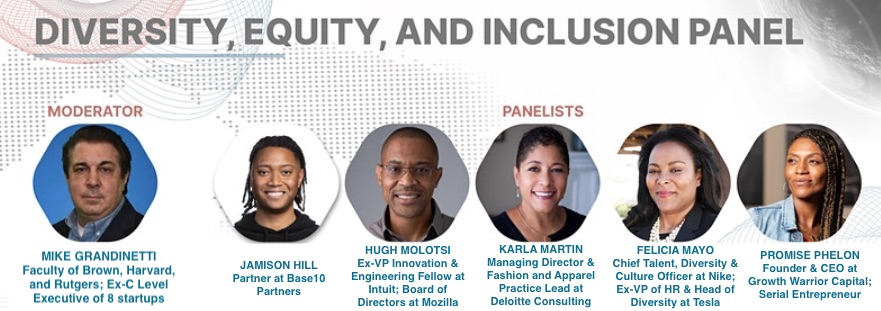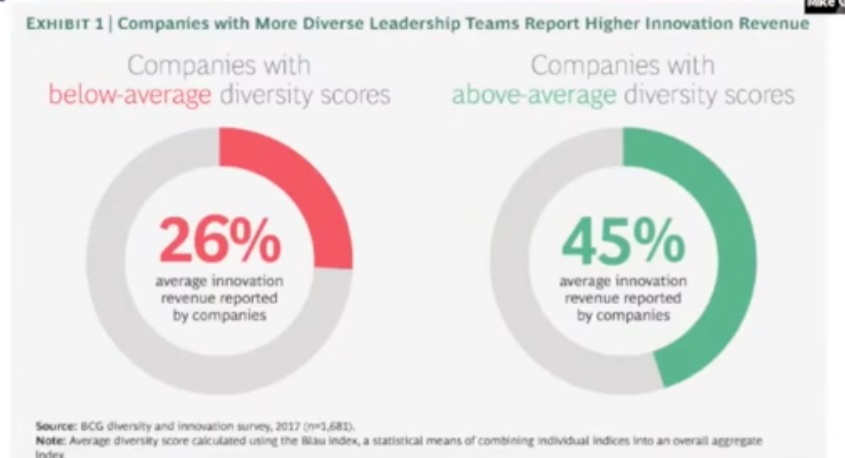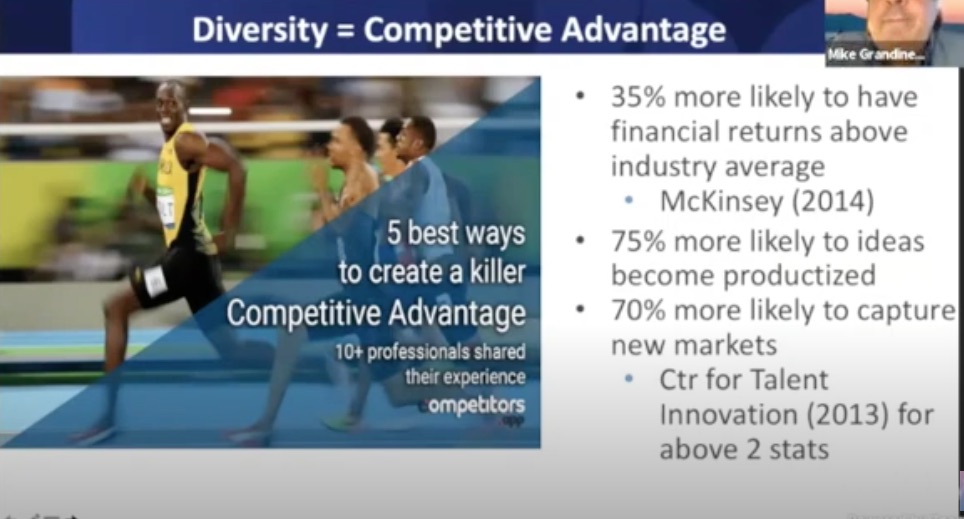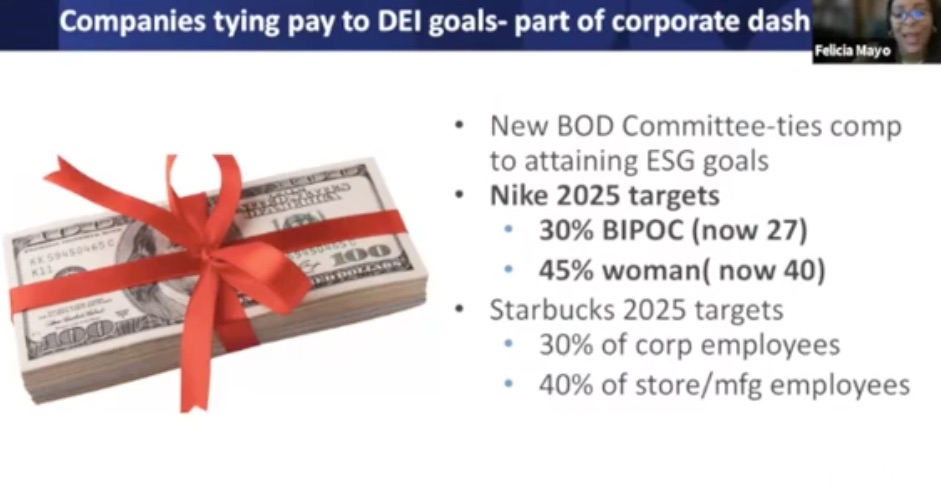“Not everything that is faced can be changed, but nothing can be changed that is not faced.” –James Baldwin
On Wednesday, July 28, some of the best minds in tech and entrepreneurship gathered together to lead a panel discussion about diversity, equity, and inclusion (DEI) in the workforce, and how companies can expand DEI efforts and opportunities specifically for Black workers and leaders in big tech, startups, professional services, and consumer brands—with a special discussion about equity and inclusion for women.
Representing a rich cross-section of industries, five extraordinary leaders discussed the measurable progress some companies have made in advancing DEI efforts, as well as the positive financial impact of increasing DEI efforts, what happens when companies do not seek to increase DEI and / or align internal and external messaging, and how any individual can do his or her part to push forward DEI in the workplace and elsewhere, and make "DEI" not just a buzzword or aspiration, but a reality.

ESTEEMED PANELISTS:
- Jamison Hill – Partner at Base10 Partners
- Hugh Molotsi – Ex-VP Innovation & Engineering Fellow, Intuit, and Board Member of Mozilla
- Karla Martin – Managing Director, Fashion and Apparel Lead at Deloitte Consulting
- Felicia Mayo – Chief Talent, Diversity & Culture Officer at Nike / Ex-VP of HR & Head of Diversity at Tesla
- Promise Phelon – Founder & CEO at the Growth Warrior; Serial Engineer
Moderator Mike Grandinetti – a highly successful entrepreneur also on faculty at Brown, Harvard, and Rutgers University (where he designed and implemented Rutgers Professional Science Master's program's signature course, Design Innovation: Make & Market Anything), stated that the goal of the event (which can now be viewed on YouTube), was "to educate and challenge the audience to have a deeper understanding of issues so [they] are no longer be part of the problem, but armed with enough information to be part of the solution.”
First topic: Ensuring that companies and leaders who publicly commit to expanding DEI efforts follow through on their words both externally and internally, and take actions above and beyond paying mere lip service to the importance of DEI among employees.
MOVING BEYOND LIP SERVICE
Each of the panelists spoke to a different aspect of DEI as related to workplace culture and talent pipeline, as well as the impact of efforts to expand DEI—or lack of efforts to expand DEI—among employees. Panelists also spoke about the extraordinary pressure of “Black Exceptionalism,” the feeling that there is no margin for error, that a perfect performance is required at all times in order to be perceived as merely adequate. At the time of this event, with Olympian Simone Biles' every move making headlines multiple times each day—her presence, her absence, her performance at events, and her statements to the media—the topic of the extraordinary pressure to be "perfect" had special relevance and resonance.
PANELISTS / COMPANY – TOPIC
FELICIA MAYO / Nike – DEI + Talent Acquisition & Retention; Aligning Internal and External Messaging
With “The Great Resignation,” in full swing, there’s been a huge loss of talent at companies nationwide, says Mayo. "The pandemic gave people year to think about what they really want," she said. “Employees are digging deep and thinking about their values and where they want to be. [They’re] looking at what companies are talking the talk...and asking ‘is this the company that aligns with my purpose?’ If you’ve done more talk than anything else– I don’t want to be here.’” In today’s hot job market, employees can leave—and they do.
“What can be done to stop the attrition of top talent?” asked Grandinetti. Identify that top talent, says Mayo, and continue to recruit and re-recruit that talent–pointing out that recruitment doesn’t stop once an employee is hired.
Also, if there’s external messaging about the importance of diversity and inclusion, “it needs to ring true externally and internally.”
Finally, Mayo spoke about her revolutionary role as Chief Talent, Diversity & Culture Officer at Nike. It’s a new role that is not just about DEI alone, she says, but, "it connects DEI and talent, which allows me to look at the end-to-end evolution of each employee’s time at Nike.” As strictly a “DEI Officer” or “CIO of Diversity,” says Mayo, “DEI” and “talent acquisition/retention” were discrete functions. Her new role unites the two initiatives.
“When people who look like us see us and we have 'talent' in our title, we break down this notion that there’s a pipeline problem [or lack of talent] in achieving diversity. It’s revolutionary, and by coupling DEI and talent, you’re also convincing stakeholders to do the right thing.
HUGH MOLOTSI / Intuit– Inclusion, Employee Recruitment, Talent Pipeline, and Credentialing
Molotsi says his rich and successful 22-year career at Intuit was due to truly enjoying both his work and his company– his role was gratifying and rewarding, he says, because he always felt valued and included. Molotsi and Grandinetti discussed the need to change outdated recruiting practices in order to expand the talent pipeline; they also discussed what credentials and levels of education are actually needed to succeed in positions in tech.
Grandinetti: “There’s such an over-credentialing requirement to bring people into software development, when, in fact, a lot of roles in tech do not need a 4-year degree. Whether you go to community college or a coding academy, you’re getting the requisite training you need to succeed at least in early-level jobs.”
Molotsi agreed, and discussed the need to look at different ways to recruit from colleges for more junior-level talent, explaining that in the past, many companies targeted only a small handful of universities. “When we [at Intuit] decided we had a talent problem, 'a pipeline problem,'" he says, “we started casting a wider net to include more schools.”
When Molotsi became a member of an engineering advisory board, he realized that it wasn’t just a talent pipeline that was a problem: “From a hiring perspective,” he said, “We had put procedures in place that made it very difficult for people who didn’t come from traditional sources to make it through to the interview pipeline.”
To Grandinetti’s point about credentials and credentialing, “It’s time to take a hard look what are the credentials we really need for the jobs,” says Molotsi, “and even the way the jobs are done.” Most of all, he says, it’s time to look at different ways to better organize the way we get work done, “and ways we can get work done differently that will allow us to have a much more diverse workforce—not just in terms of how we look, but in terms of our backgrounds and what we bring to the table.”
KARLA MARTIN (Deloitte Consulting) & PROMISE PHELON (The Growth Warrior): Black Exceptionalism, Extra Exceptionalism for Women, and The Importance of Mentorship
In addition to hard work, Martin and Phelon said they were beyond fortunate to have had extraordinary mentors. In light of the spotlight on Simone Biles at the Summer Olympics, both women also spoke about “Black Exceptionalism” and the added pressure on Black women.
Phelon: It’s hard out there for a woman of color, because there is this exceptionalism and you are judged not based on your being but on your doing-- so performance is part of how you get love and acceptance. [But] what that creates and generates in you is someone who works really hard to fit within a very small aperture of emotions of possibility.”
Martin: The biggest privilege that I hope for my children is the right to fail at something. Particularly in venture capital like when I was at Google. Black founders don't get to fail vs. the number of white founders who get “at-bats” over and over and over again. The margin for error is almost zero. Simone Biles on the large days is exactly what that feels like to all of us, because every mistake is amplified. But everybody fails, everybody falls down, and that’s how you learn— it's how you get better. That is the epitome of privilege—that you just get to fail.”
In addition to the general risks attached to failing, says Martin, there is extra pressure on Black women not to fail as a singular human being. “Every risk is just higher for every Black woman," Martin says. "Because the cost of failure [for one woman] doesn't hurt just me, it hurts Promise, it hurts Promise’s daughter, and [others]."
Phelon: "This is why mentoring—mentoring capital—is so key," says Phelon. "We need more companies launched by women and people of color. But you have to mentor those entrepreneurs to the place where they know how to create a market around their company. As a venture capitalist, I’m looking at this from two perspectives: The perspective of an entrepreneur and a founder, but also from the as someone who is writing checks. You need investors who look like Jamison [but you also] need people opening doors like Felicia and Karla.” “You can mentor people and condition them and give them the capital but on the other hand you need and once you have both of those things happening in a harmonic way, you can make a change.”
JAMISON HILL / Base10 Partners – The Advancement Initiative, and the Importance of HBCUs and Advancing STEM Education
Hill was drawn to Base10 Partners after many successful years at Bain Capital. In particular, he is heading the “Advancement Initiative,” which will enable hundreds of underrepresented minority students to attend college for careers in technology.
FACT: Historically Black colleges and universities (HBCUs) confer nearly half of all STEM degrees for African-American students, yet all 107 HBCU endowments combined are equal to just 7 percent of Stanford’s approximate $30 billion endowment.
Grandinetti and Hill discussed the disparity of endowment funds between HBCUs and non-HBCUs. Most non-HBCU high-level institutions average $410,000 per student in endowment funds, says Hill. "HBCU has only $15,000." He’s looking to close the endowment gap through the Advancement Initiative. The mechanism, he says, is to raise $300 million in a combo from HBCUs and other universities, then reinvest directly to HBCUs to create student scholarships and support university endowments.
From PR Newswire: “[The Advancement Initiative] will soon be active on 13 HBCU campuses including FAMU, Morehouse, Spelman, Howard, Hampton, and NCAT. Base10 expects 400+ students will go through the program in the first year, increasing to 1,000s annually over the next 5 years, focusing education on software engineering, design, entrepreneurship, and venture capital. Base10 is working with the Black Venture Capital Consortium (BVCC) and recruiting engineers and leadership from the Advancement Initiative's portfolio companies, as well as other partner organizations, to serve as program mentors.”
"We want to support communities of color and also ensure DEI employee base," says Hill. “But how do you tackle the root of inequality? There’s a lack of access to capital, lack of investment – and a lack of access to education.” And education, says Hill, is where you need to start.
The Economic Benefit and Competitive Advantage of DEI and Diverse Leadership Teams
“It is irrational to ignore the economic benefits of DEI,” said Grandinelli, referring to the below chart from the Boston Consulting Group, which indicates that 45 percent of all companies with above-average diversity scores reported significantly higher levels of revenue than companies with below-average diversity scores.

Companies with a diverse workforce have a distinctly competitive advantage, says Grandinetti, who used the below chart to illustrate that point.

According to McKinsey & Company:
- Companies with diverse workforce are 35 percent more likely to have financial returns above industry average
Per the Center for Talent Innovation:
- 75 percent of companies are more likely to have ideas actually become productized, “because you get that diversity of perspective and that creative tension,” says Grandinetti.
- They are also 70 percent more likely to capture new markets, says Grandinetti, “because you get innovative creative thinking.”
Incentives & Imperatives for Succesful DEI Efforts
INCENTIVES
Basing Compensation on DEI Targets
Criteria is now being established for targets to determine compensation and/or promotion based on a tangible ability to attract a diverse talent pool of professionals.

IMPERATIVES
You Need Educated Leaders
We have to make sure that our leaders are very are educated on what is diversity what is equity and what is inclusion. I want you educated as a leader because don't want you to turn through the talent—I want you to understand how to have discussions with that talent. I want you to understand what some of the challenges are to be able to know “this is not a challenge this is not a concern” it’s their [role] as a leader to help make sure that I’m given the resources and the opportunities to move forward.
Conversations Need to Be About Race
It is harder to have a conversation about race, and for big companies this is a conversation that starts and ends with race –and we have to keep our feet to the fire.
It’s easy to build a diverse environment, but it’s very hard to build an inclusive environment, and the further you are out from the mean, the harder it is to build a career…I think it's companies like Nike who were saying like [going] from 27 percent to 30 percent is meaningful …that three percent is hard work – it means that people have to stay and get promoted … that is the hard work.
LAST THOUGHTS – ADVICE FROM EACH PANELIST
Grandinetti concluded the event by asking if each panelist could impart just one thought or recommendation that would help our audience become part of the solution to expand workforce DEI—either something they should start to do, something they should stop doing, or something they should continue to do to in order to help work better together as a society to make our world more diverse, more equitable, and more inclusive.
MOLOTSI: I would ask people to step off the sidelines. There is a word that or term that I feel like is very insightful—“anti-racist.” I feel like you can use that and it's less charged. However, if people are anti-racist, how are they then essentially stepping off the sidelines and helping? So what I implore people to do is really to get educated and to be active and play a role [in expanding DEI].
MARTIN: To quote Arthur Ashe: “Start where you are. Use what you have. Do what you can.” It’s always the best way to wake up every day. Also, stop thinking that you're not part of the problem. Regardless of where you sit you are part of the problem—but you’re also part of the solution. [Sometimes] the hardest thing every day is to just get up. But tomorrow is another chance to do better just continue— just keep going. It gets better slowly, but only if you just keep trying
HILL: You've got to change the incentive structure as it exists today, because the system is designed with a set of incentives that work for the people at the top –the generation of venture capitalists ahead of me made a bunch of money backing teams of proverbial "white guys from Stanford.” They're going to keep doing that because there’s no incentive truly for them to change beyond paying lip service. In every discipline and workplace, more you can tie DEI goals to compensation and other incentives, I think that's what's needed to really drive transformation.
MAYO: Start focusing in on systemic solutions through and make sure your actions are linked deep—not just at the top of the water line. To Hugh’s point, don't be on the sidelines. Get in the game because this is everyone's game. It’s not just one gender one person. Everyone should be in this game at all times. Finally, know your purpose and think about what’s in your playbook and it might be for that day, for the month, for the quarter, for the year, but make sure you have a playbook and a game plan if you want to be in the game.
PHELON: People who would start and invest in companies need to look at underserved markets and look at companies that are actually getting incredible unicorn level returns—but in underrepresented markets. So whether you're Asian you're white you're Latina Latino…go start companies that go after the tight vertical of underrepresented communities and go build different kinds of unicorns